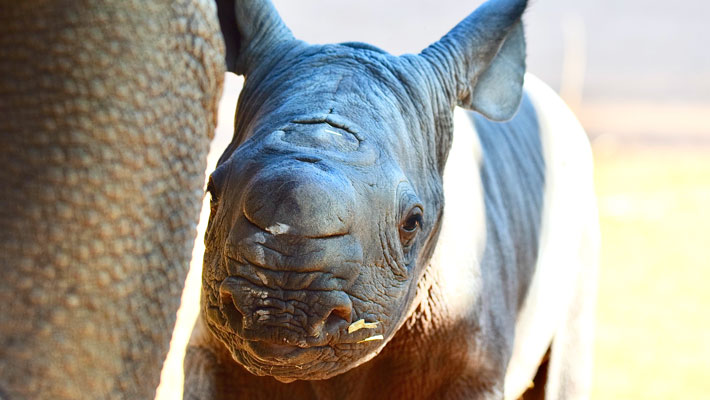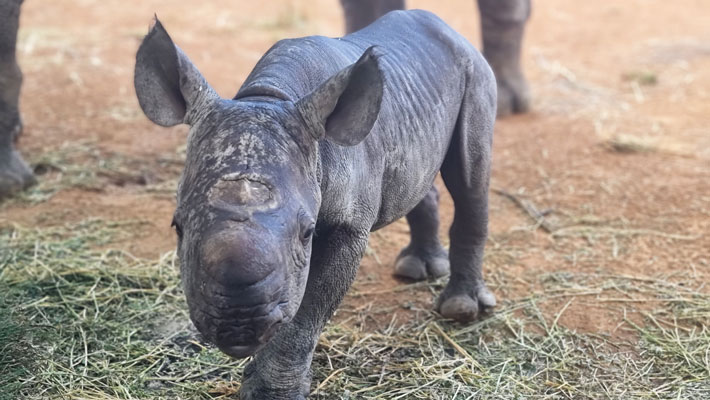Posted on 02nd May 2023 by Media Relations
Taronga Western Plains Zoo in Dubbo is celebrating the birth of a male critically endangered Black Rhino calf born on 14th April to mother Kufara using a world-first reproductive treatment for the species.
“This special birth is the result of an international research partnership in Black Rhino conservation and represents the fifth calf born into the conservation breeding program for the species in the last eight years,” Black Rhino Supervisor Jennifer Conaghan said.
“Zookeepers were given a rare treat when they actually witnessed the birth. Historically Southern Black Rhinos here at the Zoo have been born overnight after a 14–16-month gestation. This little calf was born feet first at 11.15am in a behind-the-scenes birthing yard.”
The calf is 13-year-old Kufara’s second calf. Her first calf, Mesi, was born six years ago in April 2017. With less than 6,500 Black Rhinos remaining in the wild due to habitat loss, and poaching that supplies the illegal rhino horn trade, the birth of this Southern Black Rhino is an important one. It also shines new light on the maximum gestation length the species can experience, with Kufara’s calf born 490 days after mating, which exceeds that of the longest reported length for Black Rhinos of 486 days.
“We knew exactly when Kufara’s mating occurred, so we were keeping a very close eye on her throughout and as she approached the end of her gestation,” said Rhino Keeper Jake Williams.
“We ran some tests to make sure both mum and calf were doing well, and the very next day
Kufara gave birth to a healthy boy. Both mum and calf are doing really well. Being present to witness the birth was a very special moment and something we will never forget.”


Black Rhinos in the wild typically have a calf every two and a half to four years.
“After Kufara’s first calf became more independent, we re-commenced monitoring of her reproductive cycles and behaviour, however she had trouble conceiving,” Taronga’s Manager of Conservation Science Dr Justine O’Brien said.
At the same time, Taronga’s Conservation Scientists, Veterinarians and Keepers were
undertaking a collaborative rhino research program with Omaha’s Henry Doorly Zoo and
Aquarium, and SeaWorld USA’s Species Preservation Lab, along with other conservation
partners, funded by the Institute of Museum and Library Services and the Taronga Foundation.
“Knowledge of the species’ biology generated from this, and previous programs, was integrated into Kufara’s clinical treatment to address her infertility,” Dr O’Brien said.
“This involved Kufara receiving a series of hormone treatments by our veterinary and rhino keeper teams and builds on a multi-decade program of rhino reproductive research at Taronga.”
Both mum and calf continue to bond behind the scenes and will do so for the next couple of
months, before making the move to the Black Rhino paddock where they can be seen by the public.
“Kufara and her calf are both displaying all the behaviours we want to see at this stage,” Keeper Jake said.
“The calf is suckling well and following mum around. He is a very confident little calf and seems very curious to learn about everything in his environment.”
The use of science to support best practice management of zoo-based rhino insurance populations forms part of the work at the newly opened Taronga Western Plains Zoo Wildlife Hospital. The new hospital has been developed to facilitate the highest level of care for both free-ranging and zoo-based animals, as well as advanced reproductive technologies aiding in the conservation and breeding of threatened species.
Taronga is a founding member of the International Rhino Foundation, and Taronga Western Plains Zoo is internationally renowned for its Black Rhino conservation breeding program.
Taronga actively supports conservation efforts for wild rhinos in Africa, Indonesia and India, providing funds and support with the International Rhino Foundation for anti-poaching and wildlife protection units, habitat protection and restoration, and expertise in veterinary care and reproduction to ensure all rhino species continue to survive in the wild.
To learn more, including how you can help, go to https://taronga.org.au/donate